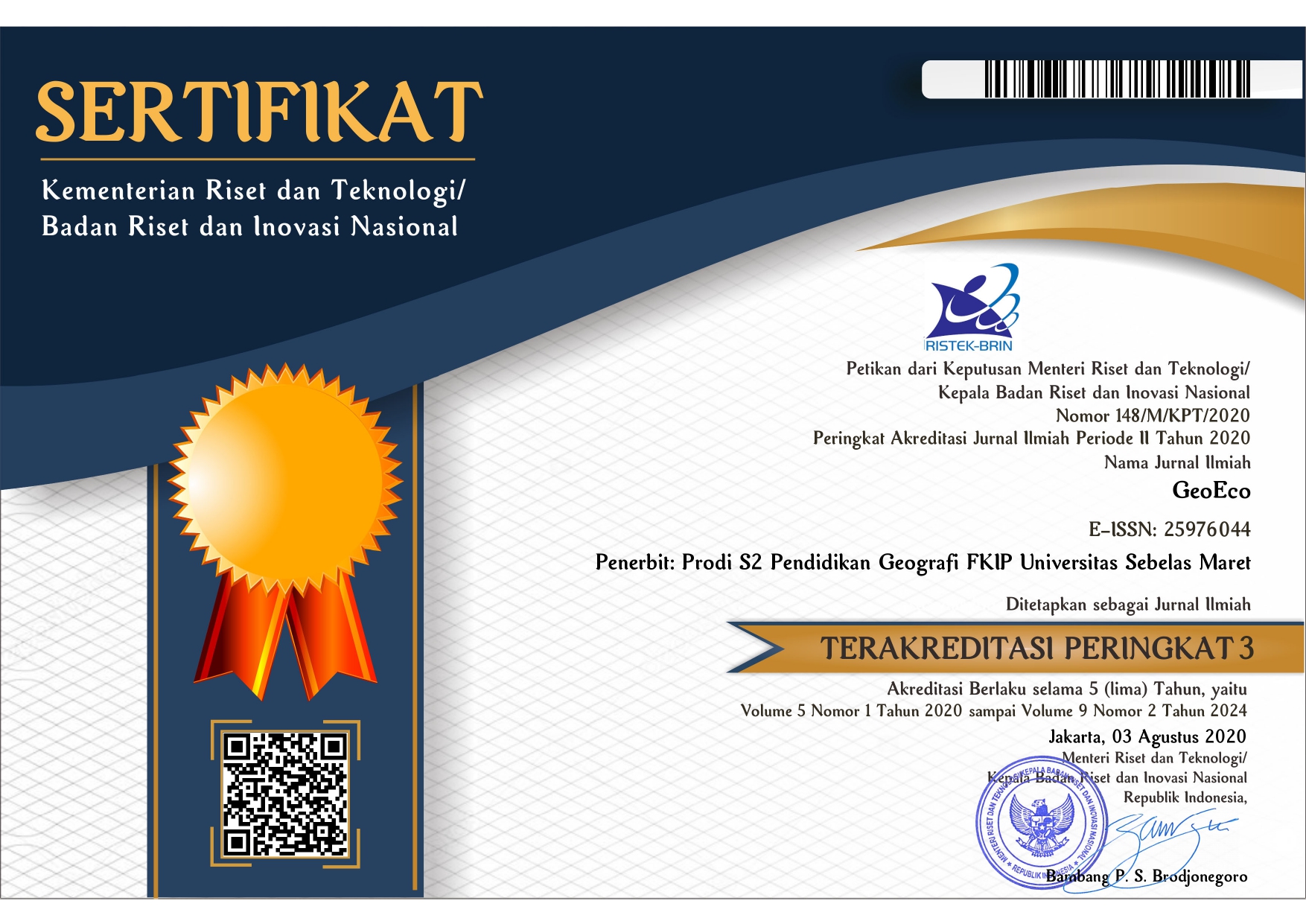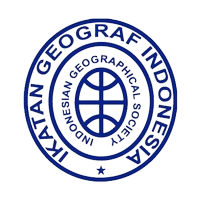READINESS OF GEOGRAPHY EDUCATION STUDENTS TO FACE THE DEMOGRAPHIC BONUS BASED ON SOFT SKILLS AND HARD SKILLS
Abstract
Keywords
Full Text:
PDFReferences
Achdut, N., & Refaeli, T. (2020). Unemployment and psychological distress among young people during the covid‐19 pandemic: Psychological resources and risk factors. International Journal of Environmental Research and Public Health, 17(19), 1–21. https://doi.org/10.3390/ijerph17197163
Aprianti, D. S. (2023). Penerapan Pendekatan Konstruktivisme Melalui Mind Mapping Untuk Meningkatkan Hasil Belajar Ips. Jurnal Riset Pendidikan Indonesia, 3(2), 278–289.
Badan Pusat Statistik. (2024). Keadaan Ketenagakerjaan Indonesia Februari 2024
Bloyd Null, D., Feeser, K., & Kurtzhals, G. (2023). An assessment of environmental literacy, behaviors, attitudes and lifestyle factors of college students. Journal of American College Health, 71(8), 2485–2494. https://doi.org/10.1080/07448481.2021.1975720
Chalfin, A., Hansen, B., Lerner, J., Parker, L., Ander, R., Apel, R., Bhatt, M., Deza, M., Doleac, J., Falco, K., Gallagher, J., Haftez, D., Jelveh, Z., Kaplan, J., Kapustin, M., Laforest, M., Ludwig, J., Macdonald, J., Maheshri, V., … Sanders, N. (2019). Reducing Crime Through Environmental Design: Evidence from a Randomized Experiment of Street Lighting in New York City. http://www.nber.org/papers/w25798
Farihah, Wahyuni Nurwihastuti, D., & Apiek Gandamana. (2018). Analisis Kesiapan Mahasiswa Kota Medan Sebagai Bagian Dari Bonus Demografi Dalam Era Masyarakat Ekonomi Asean (Mea). Jurnal Keluarga Sehat Sejahtera, 16(1), 10–27.
Haq, A. A., Awalia, N. N., Wijaya, R. A., & Nugroho, S. F. (2022). Pandemic COVID-19: An Analysis of Impact on Demographic Bonus Through Population Characteristics Based on 2016-2020 Data (Case Study in Sleman Regency, DIY). IOP Conference Series: Earth and Environmental Science, 1039(1). https://doi.org/10.1088/1755-1315/1039/1/012032
Husna, M. N., Setyowati, K., & Haryanti, R. H. (2024). Flood mitigation with the support of demographic bonuses in Indonesia. IOP Conference Series: Earth and Environmental Science, 1314(1). https://doi.org/10.1088/1755-1315/1314/1/012081
Ingsih, Kusni, & Suhana, S. (2023). Improving Working Readiness through Mastering Soft Skills: Empirical Evidence from University Students in Indonesia Suhana Suhana. Evista de Métodos Cuantitativos Para La Economía y La Empresa, 35, 268–279. www.upo.es/revistas/index.php/RevMetCuant/article/view/6426
Lutz, W., Cuaresma, J. C., Kebede, E., Prskawetz, A., Sanderson, W. C., & Striessnig, E. (2019). Education rather than age structure brings demographic dividend. Proceedings of the National Academy of Sciences of the United States of America, 116(26), 12798–12803. https://doi.org/10.1073/pnas.1820362116
Ma, Y., Liang, C., Gu, D., Zhao, S., Yang, X., & Wang, X. (2021). How social media use at work affects improvement of older people’s willingness to delay retirement during transfer from demographic bonus to health bonus: Causal relationship empirical study. Journal of Medical Internet Research, 23(2). https://doi.org/10.2196/18264
Mariyani, & Alfansyur, A. (2021). Pendidikan Indonesia Dan Kesiapannya Menghadapi Bonus Demografi. Bhineka Tunggal Ika: Kajian Teori Dan Praktik Pendidikan PKN, 8(02), 98–104.
Sabiq, M. R., & Apsari, N. C. (2021). Dampak Pengangguran Terhadap Tindakan Kriminal Ditinjau Dari Perspektif Konflik. Kolaborasi Resolusi Konflik, 3(1), 51–64.
Richo Rianto, M., Kuwara Sari, R., Sulistyowati, A., Handayani, M., & Woestho, C. (2020). Indonesian demographic bonus: Determinants of intention to use the cellular applications of tourism in Indonesia’s millennial generation. African Journal of Hospitality, Tourism and Leisure, 9(2). http//:www.ajhtl.com:https://orcid.org/0000-0002-5779-6279:https://orcid.org/0000-0002.-8091-2848
Wijaya, P. A., Suprihanto, J., & Riyono, B. (2020). Analisis Faktor-Faktor Penyebab Terjadinya Pengangguran dan Urbanisasi Pemuda di Desa Tamansari Kecamatan Karangmoncol Kabupaten Purbalingga Provinsi Jawa Tengah. Pendidikan Ekonomi Undiksha, 12(1), 117–129.












.png)

